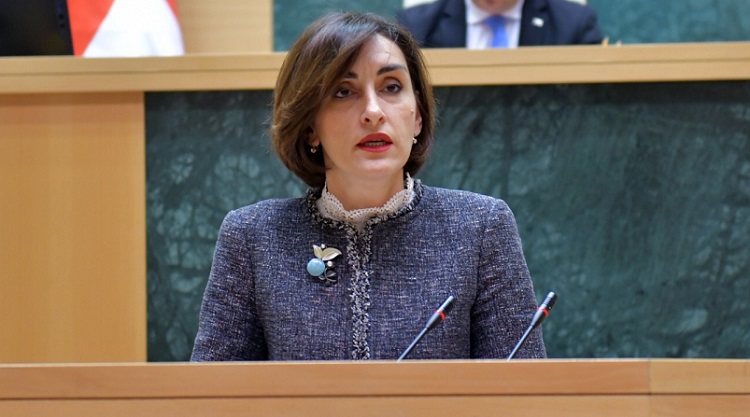Parliament Committee Chair urges opposition, civil sector to “stand by Gov’t” for EU candidacy

Maka Botchorishvili claimed the “elite part” of domestic civil society organisations were also “looking for ways to prevent the country” from obtaining the status. Photo: Parliament press office
Maka Botchorishvili, the Chair of the Georgian Parliament’s European Integration Committee, on Tuesday urged the domestic opposition and civil society organisations to “abandon destructive actions” and “stand by the Government” to ensure the European Union membership candidate status for the country later this year.
In comments at a plenary session of the Parliament, the lawmaker pointed to last week’s interim report by the European Commission on Georgia’s implementation of the 12-point conditions outlined by the bloc last year for granting the country the status, adding there was “still time and work to be done” before the Commission's final assessments in late October.
On its own the Government will not be able to accomplish the aspiration [of obtaining the status] as long as the main goal of the opposition is to spark unrest in the country and use the [question of the] status to reach this goal”, Botchorishvili said.
She added the “elite part” of domestic civil society organisations were also “looking for ways to prevent the country” from obtaining the status.
She drew a contrast to civil society groups in Moldova - a country which, along with Ukraine, was granted the bloc’s full candidacy with conditions last year - were lobbying for their country’s EU integration along with the Government.
I am not saying this to evade responsibilities from the [Georgian] Government, but to say that the bloc needs to hear one voice from Georgia that will remove - not raise - question marks”, Botchorishvili noted.
Marking the ninth anniversary of the Government’s signing of the EU-Georgia Association Agreement, the Parliamentary official claimed the Georgian Dream authorities had used “all levers and opportunities” to ensure the country’s alignment with the bloc’s standards over the years.
Hailing the EU’s decision last year to grant Georgia a European perspective as a “historic opportunity”, the lawmaker said the Government's decision in March 2022 to officially apply for the bloc’s membership came considering the “successful implementation” of the AA, the “will of the country’s population” and the domestic constitution which outlines the country’s Euro-Atlantic aspirations.
 Tweet
Tweet  Share
Share